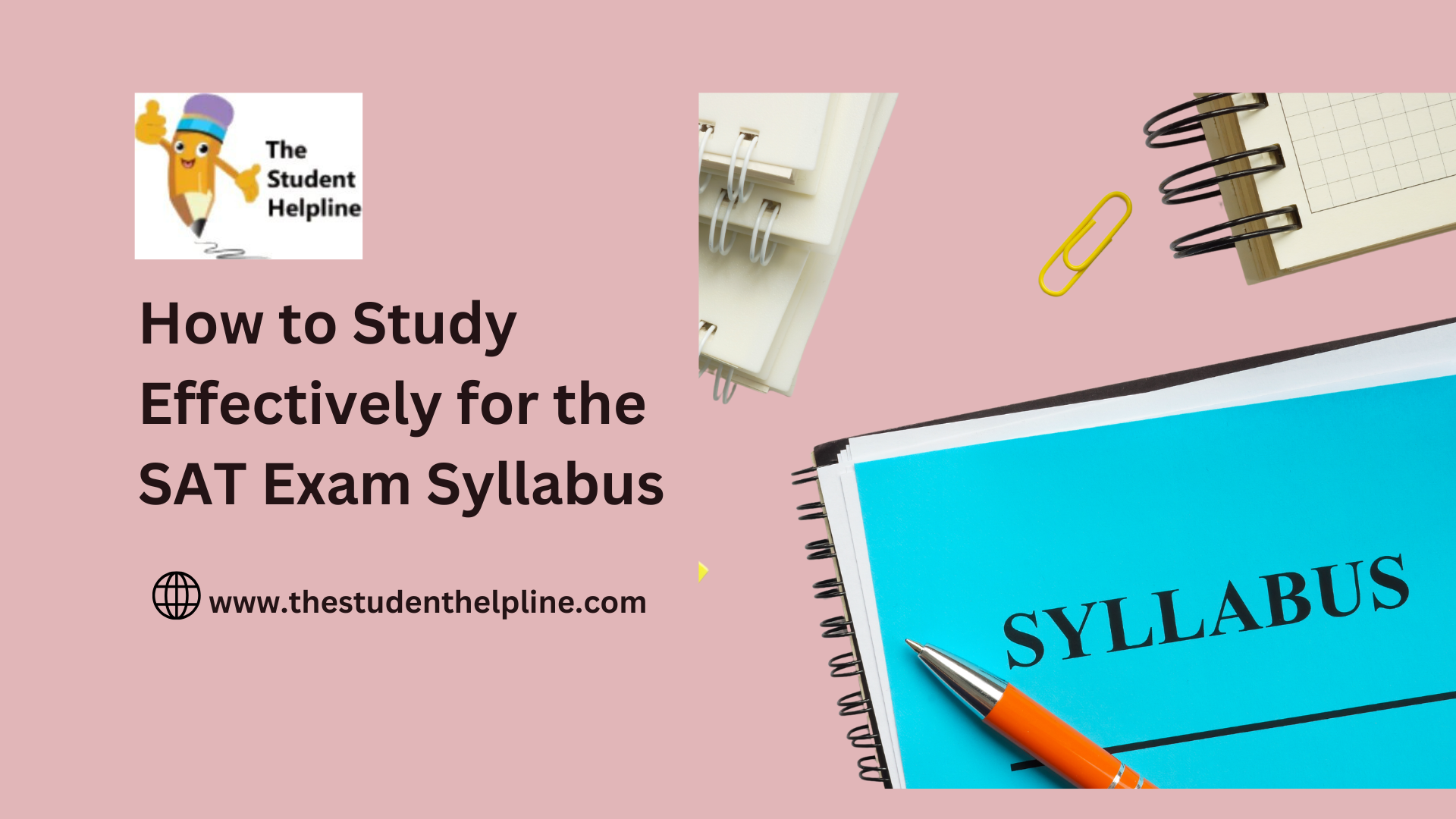Preparing for the SAT exam can be challenging, but with the right approach, you can maximize your performance and score well. The SAT is a standardized test widely used for college admissions in the United States and includes sections that assess your reading, writing, language, and math skills. This article provides practical tips and strategies to help you study effectively for the SAT exam syllabus.
Understanding the SAT Exam Syllabus
Before diving into preparation, it is essential to familiarize yourself with the structure and content of the SAT exam syllabus. The test consists of the following key sections:
- Evidence-Based Reading and Writing (EBRW):
- Reading Test: Focuses on comprehension and critical reading skills with passages from literature, historical documents, social sciences, and natural sciences.
- Writing and Language Test: Assesses grammar, punctuation, and editing skills to improve passages.
- Math Section:
- Covers topics such as algebra, problem-solving, data analysis, advanced math, and basic trigonometry.
- Divided into two parts: one allowing a calculator and the other without.
- Optional Essay (Discontinued by Many Colleges):
- If required, this involves analyzing a given passage and writing an essay explaining its arguments.
Create a Study Schedule
A well-planned study schedule is crucial for managing your time and covering the entire SAT exam syllabus. Here’s how to create one:
- Set Clear Goals: Determine your target SAT score based on the colleges you plan to apply to.
- Allocate Time for Each Section: Divide your study hours according to the weightage of each section. Spend extra time on areas where you feel less confident.
- Plan for Practice Tests: Schedule regular full-length practice tests to simulate real exam conditions and track progress.
Use High-Quality Study Resources
Invest in reliable study materials that align with the SAT exam syllabus. Here are some suggestions:
- Official SAT Study Guide: Published by the College Board, it includes practice tests and detailed explanations.
- Online Learning Platforms: Websites like Khan Academy offer free SAT preparation resources tailored to your skill level.
- SAT Prep Books: Choose comprehensive prep books from trusted publishers like Princeton Review or Kaplan.
Focus on Evidence-Based Reading and Writing
Reading Section
- Understand Passage Types: Familiarize yourself with the common types of passages, including fiction, historical documents, and scientific articles.
- Active Reading Techniques: Highlight main ideas, underline key points, and summarize passages as you read.
- Answer Strategically: Read questions first to know what to look for in the passage. Avoid overthinking the answers.
Writing and Language Section
- Learn Grammar Rules: Study fundamental grammar topics such as subject-verb agreement, parallelism, and pronoun usage.
- Practice Editing: Work on improving sentences and paragraphs for clarity and conciseness.
- Analyze Mistakes: Review incorrect answers to identify patterns and improve your accuracy.
Master the Math Section
The math section of the SAT exam syllabus covers a broad range of topics. Here’s how to prepare:
- Brush Up on Basics: Ensure you have a strong grasp of fundamental math concepts like algebra and geometry.
- Practice Problem-Solving: Work through a variety of problems to enhance your ability to solve questions efficiently.
- Use the Calculator Wisely: For the calculator-allowed section, familiarize yourself with functions to save time during the test.
- Focus on Weak Areas: Spend extra time on challenging topics, such as data interpretation or trigonometry.
Practice with Full-Length Tests
Taking practice tests under timed conditions is one of the most effective ways to prepare for the SAT exam syllabus.
- Simulate Exam Day: Use official SAT practice tests to mimic the real exam environment.
- Analyze Results: After each test, review your mistakes and focus on improving those areas.
- Track Progress: Monitor your scores to ensure steady improvement.
Develop Time Management Skills
The SAT is a timed test, making time management essential. Here’s how to optimize your time:
- Pace Yourself: Allocate a specific amount of time for each question and stick to it.
- Skip and Return: If you encounter a difficult question, move on and return to it later.
- Use Breaks Wisely: Take the designated breaks to relax and recharge during the exam.
Build Test-Taking Strategies
Success in the SAT involves more than just knowledge of the syllabus. Employ these strategies during the test:
- Answer Every Question: There is no penalty for wrong answers, so attempt all questions.
- Eliminate Wrong Choices: Narrow down answer options to improve your chances of guessing correctly.
- Stay Calm: Practice mindfulness techniques to manage stress and stay focused during the exam.
Stay Consistent and Motivated
Studying for the SAT syllabus requires consistent effort and dedication. Here’s how to stay motivated:
- Set Milestones: Break your preparation into smaller goals and reward yourself upon achieving them.
- Join Study Groups: Collaborate with peers to share insights and stay accountable.
- Visualize Success: Keep your target college and score in mind as motivation to push through challenges.
Manage Stress and Take Care of Yourself
Preparing for the SAT can be stressful, but maintaining a healthy lifestyle can enhance your performance.
- Get Adequate Sleep: Aim for at least 7–8 hours of sleep every night to stay alert during study sessions.
- Eat Nutritious Meals: A balanced diet can boost your energy and focus.
- Exercise Regularly: Physical activity helps reduce stress and improve mental clarity.
Final Week Preparation
As the exam date approaches, fine-tune your preparation:
- Revise Key Concepts: Go over formulas, grammar rules, and test strategies.
- Take a Mock Test: Simulate one last full-length practice test to build confidence.
- Organize Materials: Ensure you have all necessary items, including your admission ticket, ID, calculator, and snacks.
Exam Day Tips
On the day of the exam, keep these tips in mind to perform your best:
- Arrive Early: Reach the test center with plenty of time to spare.
- Stay Relaxed: Take deep breaths and focus on one section at a time.
- Review Your Work: If time permits, double-check your answers to minimize mistakes.
By following these strategies, you can prepare effectively for the SAT exam syllabus and increase your chances of achieving a high score.
Also Read
- ► StreamEastXYZ: A Game Changer in Sports Streaming Services
- ► Eric Emanuel Shorts Perfect for Pre-Game Warmups
- ► The Timeless Charm of 35mm Film Cameras: Exploring SLRs, Rangefinders, Point & Shoot Cameras, and Vintage Lenses
- ► How to Choose the Best SOP Help for Your University Applications
- ► Exploring Iconic Vintage Cameras: A Look at the Canon Sure Shot, Olympus Mju, Minolta, and More
- ► The History of the Stussy Hoodie How It Became Iconic
- ► Pull Stussy: Redefining Streetwear Style
- ► Why Are Fashionistas Obsessed with the sp5der & Broken Planet Hoodie Trend
- ► Sell Your Old or Damaged Car with Ease via Ezy Car Wreckers Adelaide
- ► Just-kill pro: Unmasking the CC Dump Market
- ► What are dissertation writing services, and how do they work?
- ► Why Payroll Outsourcing is Essential for Singapore Companies
- ► Best Migration Agent Brisbane
- ► Greener Energy Utilization: Harnessing Renewable Resources for a Sustainable Future
- ► Finding Reliable Driveway Contractors Near Me | Black Tar





